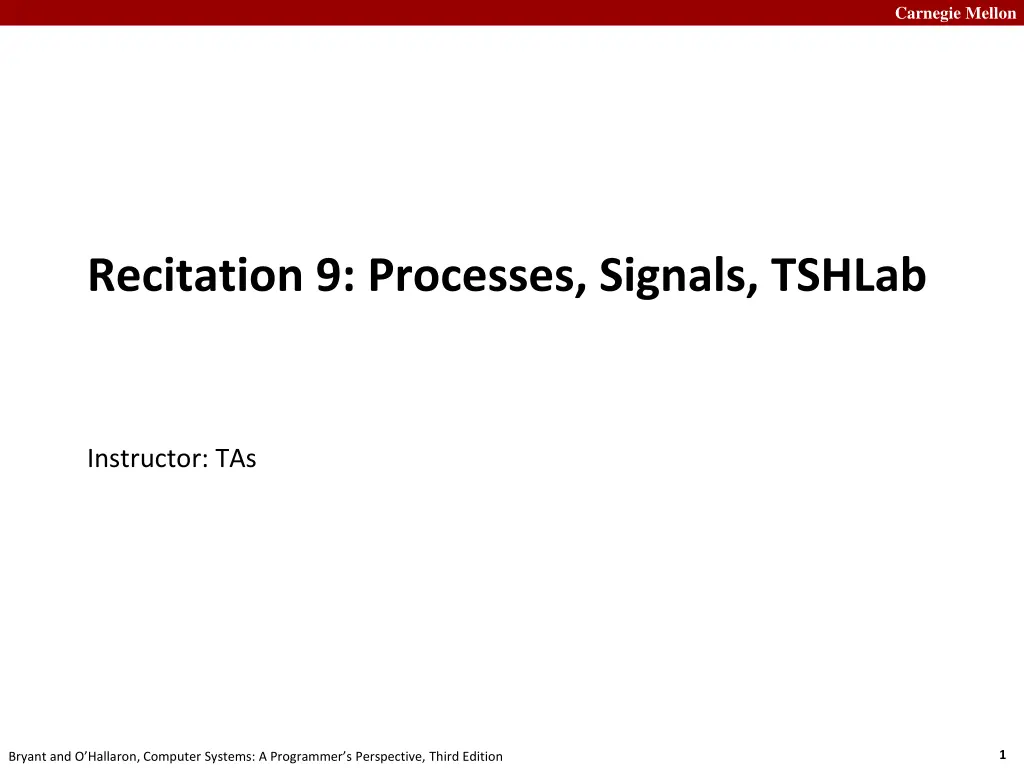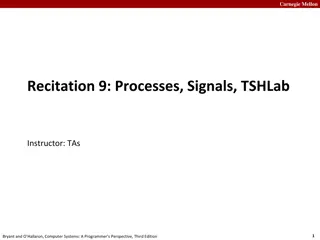
Carnegie Mellon Computer Systems Learning Resources
Explore Carnegie Mellon's computer systems learning resources covering topics like processes, signals, shell labs, and more. Get insights into common mistakes, grading styles, and important points for assignments. Enhance your understanding of process lifecycle phases and programming concepts.
Download Presentation

Please find below an Image/Link to download the presentation.
The content on the website is provided AS IS for your information and personal use only. It may not be sold, licensed, or shared on other websites without obtaining consent from the author. If you encounter any issues during the download, it is possible that the publisher has removed the file from their server.
You are allowed to download the files provided on this website for personal or commercial use, subject to the condition that they are used lawfully. All files are the property of their respective owners.
The content on the website is provided AS IS for your information and personal use only. It may not be sold, licensed, or shared on other websites without obtaining consent from the author.
E N D
Presentation Transcript
Carnegie Mellon Recitation 9: Processes, Signals, TSHLab Instructor: TAs 1 Bryant and O Hallaron, Computer Systems: A Programmer s Perspective, Third Edition
Carnegie Mellon Outline Cachelab Style Process Lifecycle Signal Handling 2 Bryant and O Hallaron, Computer Systems: A Programmer s Perspective, Third Edition
Carnegie Mellon Style Grading Cachelab grades will soon be available on Autolab Click view source on your latest submission to see our feedback Common mistakes Descriptions at the top of your file and functions. NULL checking for malloc/calloc and fopen. ERROR CHECKING IS KEY IN TSHLAB! Writing everything in main function without helpers. Lack of comments in general. The labs are hard, don t lose points after your hard work. 3 Bryant and O Hallaron, Computer Systems: A Programmer s Perspective, Third Edition
Carnegie Mellon Shell Lab Due next week, Tuesday, October 31st. Simulate a Linux-like shell with I/O redirection. PLEASE review the lecture slides and read the writeup before starting, and also while mid way through the assignment. A lot of important points mentioned in the writeup. Lot of style points can be saved solely by reading the writeup and following the instructions. Pay attention to race conditions! 4 Bryant and O Hallaron, Computer Systems: A Programmer s Perspective, Third Edition
Carnegie Mellon Process Lifecycle We will review each of these phases today Fork() Create a duplicate, a child , of the process Execve() Replace the running program Exit() End the running program Waitpid() Wait for a child 5 Bryant and O Hallaron, Computer Systems: A Programmer s Perspective, Third Edition
Carnegie Mellon Notes on Examples Full source code of all programs is available TAs may demo specific programs In the following examples, exit() is called We do this to be explicit about the program s behavior Exit should generally be reserved for terminating on error Unless otherwise noted, all syscalls succeed Error checking code is omitted. 6 Bryant and O Hallaron, Computer Systems: A Programmer s Perspective, Third Edition
Carnegie Mellon Processes are separate How many lines are printed? If pid is at address 0x7fff2bcc264c, what is printed? int main(int argc, char** argv) { pid_t pid; pid = fork(); printf( %p - %d\n , &pid, pid); exit(0); } 7 Bryant and O Hallaron, Computer Systems: A Programmer s Perspective, Third Edition
Carnegie Mellon Processes Change What does this program print? int main(int argc, char** argv) { char* args[3]; args[0] = /bin/echo ; args[1] = Hi 18213! ; args[2] = NULL; execv(args[0], args); printf( Hi 15213!\n ); exit(0); } 8 Bryant and O Hallaron, Computer Systems: A Programmer s Perspective, Third Edition
Carnegie Mellon On Error How should we handle malloc failing? const size_t HUGE = 1 * 1024 * 1024 * 1024; int main(int argc, char** argv) { char* buf = malloc(HUGE * HUGE); if (buf == NULL) { fprintf(stderr, "Failure at %u\n", __LINE__); exit(1); } printf("Buf at %p\n", buf); free(buf); exit(0); } 9 Bryant and O Hallaron, Computer Systems: A Programmer s Perspective, Third Edition
Carnegie Mellon Exit values can convey information Two values are printed, describe their relation. int main(int argc, char** argv) { pid_t pid = fork(); if (pid == 0) { exit(getpid());} else { int status = 0; waitpid(pid, &status, 0); printf( 0x%x exited with 0x%x\n , pid, WEXITSTATUS(status)); } exit(0); } 10 Bryant and O Hallaron, Computer Systems: A Programmer s Perspective, Third Edition
Carnegie Mellon Processes have ancestry Find the errors in this code, assume fork() and exit() are successful int main(int argc, char** argv) { int status = 0, ret = 0; pid_t pid = fork(); if (pid == 0) { pid = fork(); exit(getpid()); } ret = waitpid(-1, &status, 0); printf( Process %d exited with %d\n , ret, status); ret = waitpid(-1, &status, 0); printf( Process %d exited with %d\n , ret, status); exit(0); } 11 Bryant and O Hallaron, Computer Systems: A Programmer s Perspective, Third Edition
Carnegie Mellon Process Graphs How many different sequences can be printed? int main(int argc, char** argv) { int status; pid_t pid; if (fork() == 0) { pid = fork(); printf( Child: %d\n , getpid()); if (pid == 0) {exit(0);} } pid = wait(&status); printf( Parent: %d\n , pid); exit(0); } 12 Bryant and O Hallaron, Computer Systems: A Programmer s Perspective, Third Edition
Carnegie Mellon Process Diagram --fork---wait--------------------------------- --------------------------------print---exit --- ---fork---print---wait---print---exit --- ---print---exit 13 Bryant and O Hallaron, Computer Systems: A Programmer s Perspective, Third Edition
Carnegie Mellon Process Graphs How many different sequences can be printed? int main(int argc, char** argv) { pid_t pid; char* tgt = child ; pid = fork(); if (pid == 0) { pid = getppid(); // Get parent pid tgt = parent ; } kill(pid, SIGKILL); printf( Sent SIGKILL to %s:%d\n , tgt, pid); exit(0); } 14 Bryant and O Hallaron, Computer Systems: A Programmer s Perspective, Third Edition
Carnegie Mellon Signals and Handling Signals can happen at any time Control when through blocking signals Signals also communicate that events have occurred What event(s) correspond to each signal? Write separate routines for receiving (i.e., signals) 15 Bryant and O Hallaron, Computer Systems: A Programmer s Perspective, Third Edition
Carnegie Mellon Blocking Signals What value(s) does this code print? int counter = 0; void handler(int sig) {counter++;} int main(int argc, char** argv) { sigset_t mask, prev; int i; sigfillset(&mask); sigprocmask(SIG_BLOCK, &mask, &prev); signal(SIGCHLD, handler); for (i = 0; i < 10; i++) { if (fork() == 0) {exit(0);} } sigprocmask(SIG_SETMASK, &prev, NULL); printf( %d\n , counter); return 0; } 16 Bryant and O Hallaron, Computer Systems: A Programmer s Perspective, Third Edition
Carnegie Mellon Proper signal handling For the previous code, how to handle the signals? We want to count child exits. We don t want to count exits until all 10 children are created. Discuss 17 Bryant and O Hallaron, Computer Systems: A Programmer s Perspective, Third Edition
Carnegie Mellon If you get stuck Read the writeup! Do manual unit testing before runtrace and sdriver! Read the writeup! Post private questions on piazza! Read the man pages on the syscalls. Especially the error conditions What errors should terminate the shell? What errors should be reported? 18 Bryant and O Hallaron, Computer Systems: A Programmer s Perspective, Third Edition

